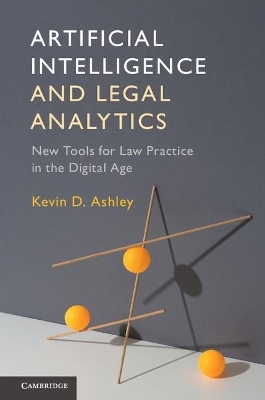
Artificial Intelligence and Legal Analytics
Cambridge University Press (Verlag)
978-1-316-62281-0 (ISBN)
The field of artificial intelligence (AI) and the law is on the cusp of a revolution that began with text analytic programs like IBM's Watson and Debater and the open-source information management architectures on which they are based. Today, new legal applications are beginning to appear and this book - designed to explain computational processes to non-programmers - describes how they will change the practice of law, specifically by connecting computational models of legal reasoning directly with legal text, generating arguments for and against particular outcomes, predicting outcomes and explaining these predictions with reasons that legal professionals will be able to evaluate for themselves. These legal applications will support conceptual legal information retrieval and allow cognitive computing, enabling a collaboration between humans and computers in which each does what it can do best. Anyone interested in how AI is changing the practice of law should read this illuminating work.
Kevin Ashley is a Professor of Law and Intelligent Systems at the University of Pittsburgh, Senior Scientist, Learning Research and Development Center, and Adjunct Professor of Computer Science. He received a B.A. from Princeton University, New Jersey, a J.D. from Harvard Law School, Massachusetts and a Ph.D. in computer science from the University of Massachusetts. A visiting scientist at the IBM Thomas J. Watson Research Center, New York, NSF Presidential Young Investigator and Fellow of the American Association for Artificial Intelligence, he is co-Editor-in-Chief of Artificial Intelligence and Law and teaches in the University of Bologna Erasmus Mundus doctoral program in Law, Science and Technology.
Part I. Computational Models of Legal Reasoning: 1. Introducing AI and Law and its role in future legal practice; 2. Modeling statutory reasoning; 3. Modeling case-based legal reasoning; 4. Models for predicting legal outcomes; 5. Computational models of legal argument; Part II. Legal Text Analytics: 6. Representing legal concepts in ontologies and type systems; 7. Making legal informational retrieval smarter; 8. Machine learning with legal texts; 9. Extracting information from statutory and regulatory texts; 10. Extracting argument-related information from legal case texts; Part III. Connecting Computational Reasoning Models and Legal Texts: 11. Conceptual legal information retrieval for cognitive computing; 12. Cognitive computing legal apps.
| Erscheinungsdatum | 23.06.2017 |
|---|---|
| Zusatzinfo | 26 Halftones, black and white; 85 Line drawings, black and white |
| Verlagsort | Cambridge |
| Sprache | englisch |
| Maße | 151 x 226 mm |
| Gewicht | 710 g |
| Themenwelt | Informatik ► Theorie / Studium ► Künstliche Intelligenz / Robotik |
| Recht / Steuern ► EU / Internationales Recht | |
| Recht / Steuern ► Privatrecht / Bürgerliches Recht ► Berufs-/Gebührenrecht | |
| ISBN-10 | 1-316-62281-9 / 1316622819 |
| ISBN-13 | 978-1-316-62281-0 / 9781316622810 |
| Zustand | Neuware |
| Haben Sie eine Frage zum Produkt? |
aus dem Bereich


